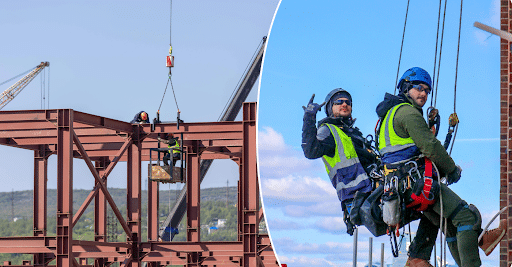The U.S. construction industry has begun to see the light at the end of the tunnel from its pandemic times. Demand for construction is surging, especially in the red-hot residential market. With so much need for construction services, entrepreneurs are considering whether now might be a good time to start their own contracting companies.
Much like a building, any construction business needs to be built on a solid foundation. And just like the thick black trash bags contractors use, it needs to be able to hold when things get heavy. In this guide, we’ll discuss how you can start a construction business that’s set up for long-term success.
Table of Contents
Types of Construction Companies
One of your first decisions will be establishing which construction sector you’ll focus on: residential, commercial or both. Research demand trends in local markets for various contractor services and consider how your experience and skills align with existing needs.
Another big decision is whether you want to operate as a general contractor (GC) or subcontractor. A general contractor takes on a more management-like role on most projects, while subcontractors perform more of the technical and physical work.
Both GCs and subs are necessary parts of the construction world, although there are important differences in factors like how they get paid.
One important aspect for sustained success is knowing where your business fits within a network.
For example, if you’re starting a general contracting business, do you have known reliable subcontractors that you can work with? If you’re starting an HVAC contracting service, do you know GCs who can help you get contracts? Play to your own strengths and to the strengths of your network.
Licensing, Insurance and Bonding
Contractors need a license from a state authority in most U.S. states, and you might need a local license as well. Getting a contractor’s license involves providing financial information and a business plan for your construction company to the state licensing authority.
You’ll also often need to take a contractor’s exam to demonstrate your knowledge of the field, although you might be able to waive it if you have enough experience.
Insurance is a must-have, both legally and practically. Most construction companies will need to carry general liability, errors & omissions, commercial auto and workers’ compensation insurance. (Other policies might also be required depending on your specialty.)
Finally, many contractors will also need a surety bond, a specialized type of insurance that guarantees your financial obligations.
Financing Your Construction Company
Almost all construction companies take out financing to begin their operations. Most use a combination of business lines of credit, small business loans and equipment loans. Some contractors might also be able to get SBA loans from the federal government.
Startup costs aren’t the only time you’ll need credit. In fact, financing and credit are widespread tools in construction that help ensure that contractors have access to the funds they need to complete projects. That means that it’s important to know about options like invoice factoring, which allows you to borrow against the value of debts owed to you.
To get a sufficient and sustainable cash flow, you’ll need to maintain excellent relationships with lending partners.
Paying your bills on time should obviously be a high priority, but it’s also vital to communicate early and often with lenders when payments will be delayed. Failure to do so could result in a poor credit rating and an inability to obtain critical financing.
Navigating the Labor Market
Finding reliable construction labor is one of the biggest challenges of the post-pandemic construction market. For a start, make sure you’re familiar with federal and state construction labor laws. Be prepared to go through the I-9 verification process to ensure workers are legally allowed to work in the U.S.
To help attract the talent you need, be prepared to negotiate on salary with applicants, and make sure you’re offering the right benefits. Connect with people looking for work via job boards, both general (like Indeed or ZipRecruiter) and specific (like ConstructionJobs).
Offering referral bonuses can also be a strong strategy since it allows you to leverage employees’ social networks to find great talent.
When planning your future approach to recruitment, remember the importance of community. Collaboration between contractors and educational institutions is a key piece of the long-term reforms needed to train the next generation of trades workers.
Apprenticeship and trade school programs offer a great place to start, as many seek out contractor partners to place graduates with.
Equipment and Materials
Materials and equipment are some of the biggest expenses in construction, but it’s essential to prioritize quality. (Just ask any contractor who’s ever bought normal kitchen garbage bags instead of rugged contractor bags.)
Give careful consideration to a supplier’s reputation in the industry and the payment terms that they offer. For items like heavy construction equipment, remember that renting is often an option.
Financing for materials and equipment costs is another important aspect to consider. Expenses like material costs and equipment rental do eventually get reimbursed by project owners. However, many contractors use trade credit arrangements to ensure that they have access to the right materials when they need them.
Unfortunately, pandemic-related disruptions in the construction supply chain could continue for some time. For new construction ventures in particular, now is a critical time to build a more resilient supply chain. Focus on suppliers that offer comprehensive customer support and fast, reliable shipping.
Finding Leads and Contracts
A contractor needs contracts, and it can be tough to win your first bids when starting out. Public RFP databases are a good place to begin. These sites list thousands of request for proposals (RFPs) that can provide a head start. Get familiar with the basics of placing a construction bid before you begin the process for the first time.
As your business grows, it’s important to create a network of contacts in the business and construction communities. These contacts will form the foundation of your ability to generate leads in the future.
Make sure to keep in contact with clients from successful past projects, and consider using a CRM software suite to more effectively manage your relationships.
Running an independent business is challenging in any industry, and the construction industry is tougher than most. The construction businesses that thrive in the long-term are the ones that take steps from the beginning to do so.
However, it’s also never too late to make adjustments that will help put your construction company on an improved footing for the future.








